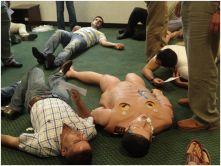 Role plays were an integral part in the training, with trainees actively participating in potential scenarios. In collaboration with the World Health Organization (WHO) and the UK Department for International Development (DFID), the WHO Regional Centre for Environmental Health Action (CEHA) with UK-Med, co-organized a regional training for health care first responders to trauma and chemical exposure events in Amman, Jordan, from 28 to 30 July.
Role plays were an integral part in the training, with trainees actively participating in potential scenarios. In collaboration with the World Health Organization (WHO) and the UK Department for International Development (DFID), the WHO Regional Centre for Environmental Health Action (CEHA) with UK-Med, co-organized a regional training for health care first responders to trauma and chemical exposure events in Amman, Jordan, from 28 to 30 July.
In the context of growing regional insecurity, WHO is increasingly solicited to provide guidance and training on preparedness and response to a broad range of emergency events, including chemical exposure for a range of stakeholders.
The training, carried out by experts from the UK’s International Emergency Trauma Register aimed to deliver interactive, simulation-based training and education focusing on: the recognition of chemical, biological, and radiological agent toxdromes; the stepwise approach to trauma care in contaminated patients; health worker protection; and the challenges of triage in the contaminated patient.
Participants included medics, paramedics and managers in ministries of health in Jordan, Iraq and Lebanon, and also representatives of several Jordan-based international nongovernmental organizations.
“The course was highly informative, contextually relevant and professionally executed. As an operationally oriented emergency nongovernmental organization, the course’s pertinence could not be overstated given the suggested threats and potential risks touted throughout the region at this time,” said Mathew Russell, a participant in the training, from Norwegian ReCountry Security Manager.
“I learned something new; it was an absolute pleasure to attend such training. Now, I feel that if there is a public accident regarding chemicals I would be more knowledgeable what to do.” Mr Taqfeeq Zaatrah, United Nations Relief and Works Agency.
Ms Hind Ghorayeb, a security analyst for UNDSS, believed that the course was “very interesting, with a good mix of theory and practice. I can now identify some of the different types of chemical or biological agents. The practical exercises made the theory much more concrete.” The training of trainers aspect was underlined by Dr Ahmed Sleman Salim, Manager of the Health Operations Department, Ministry of Health, Erbil, who stated “I now have a good idea on the specific effects of chemicals , and the procedures needed to undertake if such an event would occur. I hope to go back to my colleagues, especially those who are designated first aid individuals and to teach them all that I have learned in these past 3 days.”
The UK trainers also drew lessons from the experience, “We have received very good feedback, which enabled us to reinforce basic principles of care and where needed, retraining people: all in all we believe the training was a success.” Eoin Walker, paramedic with the London Ambulance Service and UKMed and a trainer on the course.
“I believe that the key benefits realized from the CeTC training were the in-depth and practical capacity building type exercises, with numerous field-based experiences and “hands-on” triages.” Dr A. Basel Al-Yousfi, Director of WHO/CEHA commented. Opportunities for replication of this well-received and effective course to respond to indications of demand are currently being explored.
Related links
What to do in case of a chemical release
Health aspects of biological, chemical and radionuclear threats
UK Department for International Development (DFID)


